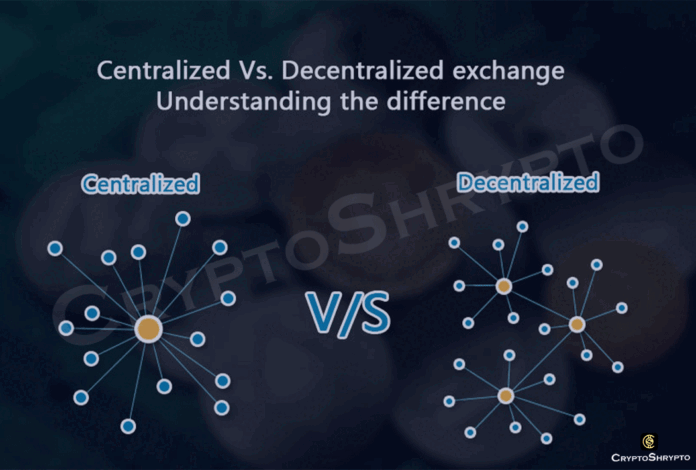What is a Centralized Cryptocurrency Exchange?
A centralised cryptocurrency exchange is a platform for buying and selling digital assets. In this type of platform, users must rely on a third party to monitor the transaction and safeguard the assets on the buyer’s and seller’s behalf. Deals in this format are not logged on the blockchain. Such transactions need the submission of your personal information for verification.
The centralised cryptocurrency exchanges provide their consumers flat pairings at steady values. These platforms are commonly used by cryptocurrency users, and you can simply discover one of them online. Binance, Coinbase, LocalBitcoins, and other centralised cryptocurrency exchanges are examples.
What is a Decentralized Cryptocurrency Exchange?
A decentralised cryptocurrency exchange is similar to a centralised one and the basic difference is that it does not rely on a third party. This exchange’s money is all held on the blockchain. It is also termed as “DEx”.
In a DEx, the user brings cryptocurrency to the gate, which keeps it and issues proxy tokens to the user. The user can now use these tokens within the exchange’s blockchain. These tokens are collateralised by the real cryptocurrency contained in the gates.
The user can place an order to sell current tokens in exchange for another type of token. The executed order, its matching procedure, and all subsequent operations are all saved on the exchange’s blockchain, which is the first highlight of these locations. When a user receives tokens as part of a transaction, they may also be converted into actual cryptocurrency.
| Basis of difference | Decentralized Crypto Exchange | Centralized Crypto Exchange |
| Speed | Orders might take up to a minute to execute | Orders are carried out in milliseconds. |
| Liquidity | Low Liquidity | High Liquidity |
| Regulation | It is difficult to regulate; it does not require a licence. | It is simple to regulate, but it does need a licence from the government. |
| Features | There are very few functionalities accessible. | It has a number of characteristics/functionalities. |
| Fees | No charges or extremely low costs | Fees are levied for utilising the platform. |
| Popularity | Not extremely well-known | Extremely popular |
| Security | There is no risk of hacking or other threats. | High risk of hackers and internal issues |
| Control | The user has the most control. | The platform has the most authority. |




